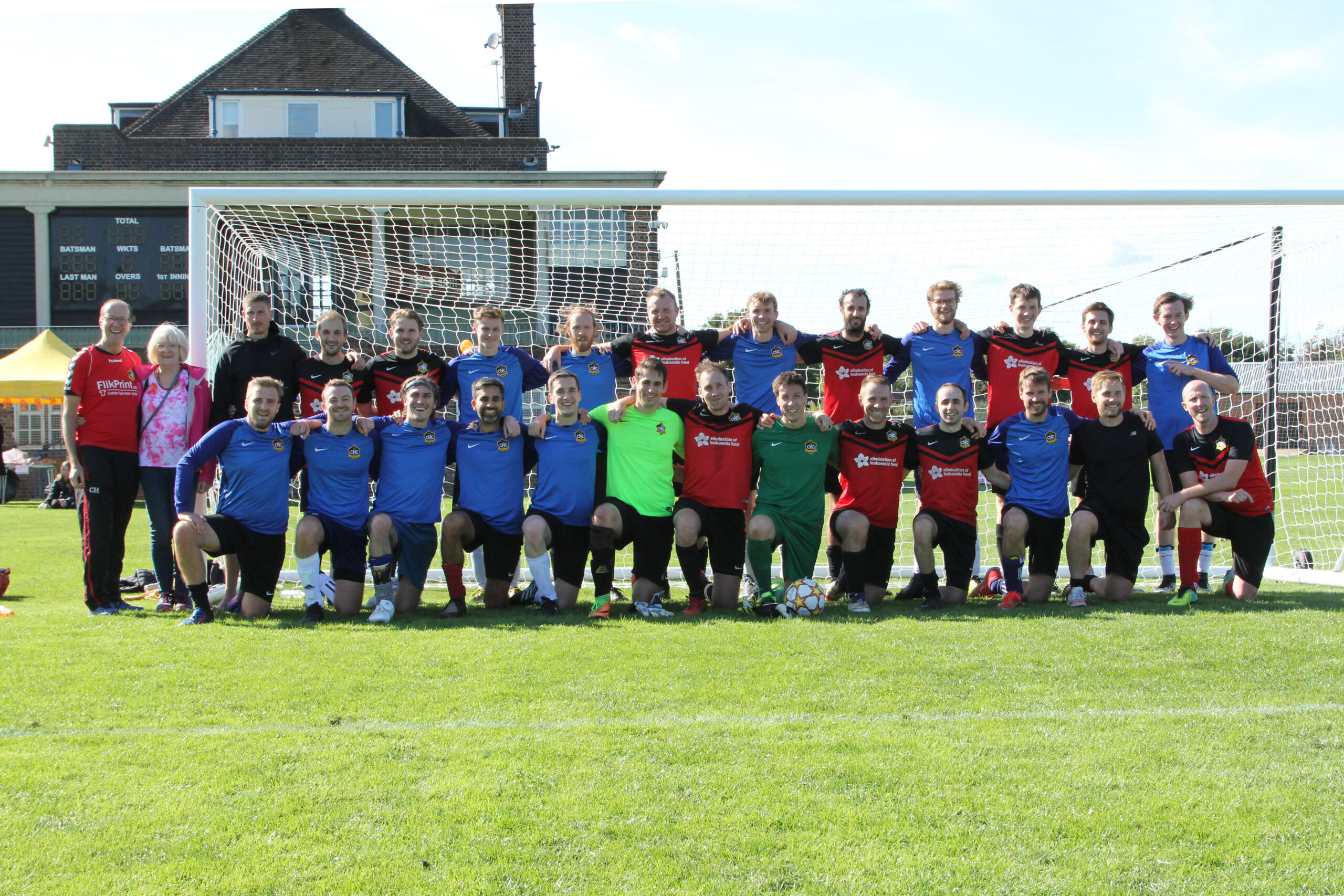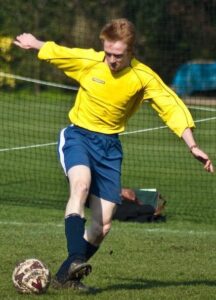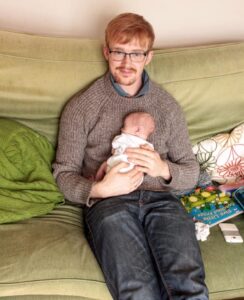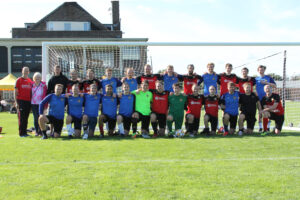
11 Nov 2024
The power of friendship, football and fundraising: Carl’s story
When keen sportsman Carl Hewson died from leukaemia at the age of 27, his family and friends were inspired to raise nearly £50,000 for Leukaemia UK in his memory.
Carl’s symptoms started around February 2015 with repeated infections, which he and his parents, Nigel and Auriol, thought were just normal winter illnesses. But by early summer the tiredness and recurrent sickness, along with mouth ulcers, throat infections, pain in his back and red spots on the soles of his feet, had really started to get Carl down.

Carl the footballer
“He had been living in a flat in Bromley with a friend and pursuing his career in engineering with the firm Arup. But by the end of June, he was unable to find the strength to care for himself and had returned home so we could look after him as he had now been off work for several weeks,” said Nigel, who lives in Orpington in Kent.
“He had been to the doctor’s and to the dentist about his throat infections, the mouth ulcers and the funny little spots on his feet and was having physiotherapy for his back pain. He was given antibiotics and antiviral medication at various appointments and in mid-June the doctor took a blood test. Carl kept phoning for the blood test results but was told each time that they had not come back yet. We found out later the blood sample had clotted and was useless to the lab. A request for a further sample was sent by the lab but somehow was lost in the system.
“In the second week in July we had become increasingly alarmed as Carl was sleeping 16 hours a day and was complaining of chest pains,” said Auriol. “So, I accompanied him to a doctor’s appointment. The doctor took all his vital signs and said they were all within the normal range. I told him that they might be within the normal range for many adults, but Carl was extremely fit, and his resting heart rate was usually in the mid-40s and was now 70 beats per minute. The doctor said he wasn’t too concerned but would repeat the blood test.”
Within 24 hours of the second blood test, Carl was contacted to say he should go straight to A&E at the Princess Royal University hospital with an overnight bag as there was a concern about the results.
“We were met by a very kind haematology registrar who told us that Carl had some sort of leukaemia and needed immediate treatment, though we wouldn’t know the type of leukaemia until further tests had been carried out,” said Auriol. “He said that his white blood cell count was so high that he could only possibly be still functioning at any level because of his fitness. Carl was at peak fitness. He had run cross country for Kent in his teens and had continued to run for pleasure, play football regularly and undertake fitness training in the gym during post university years.
“Later on, we found out members of the football team had been puzzled when a couple of months before Carl’s diagnosis he had started to ask to be substituted after the first half of a football match. Prior to that, Carl was the fittest and fastest member of the team. We were all overwhelmed by the diagnosis and very emotional, but Carl said in some ways he was relieved to have some answers.”
Carl was officially diagnosed with acute myeloid leukaemia (AML) in late July 2015. Chemotherapy had already started, immediately after admission to hospital. But just a few hours into treatment, Carl’s condition deteriorated, and he was taken to intensive care. His parents were told it would be touch and go as to whether he would survive the night.
“Thankfully he did survive, and his white blood cell count started to come down,” said Nigel. “Once he was stable, he was transferred to the specialist haematology unit at Kings College Hospital in London where treatment continued, though the white cell count had been so high he had to have 1.5 litres of fluid drained from around his heart (where the dead white cells had accumulated) in a risky procedure. Again, we were told he might not survive.
“It was very scary for Carl and for us as he was in an isolation room and felt very weak, alone and vulnerable. After nine weeks, two rounds of chemotherapy and just as the team were going to suggest Carl came home for a break, he got neutropenic septic shock and was again admitted to intensive care where he fought for his life for three weeks. During this time, he lost an eye due to infection and had several operations to drain abscesses on his arms and fluid from his lungs. He eventually came home for the first time in four months in the second half of November. But he was so weak he couldn’t stand unaided and had to learn to walk again.
“He was on a trial drug which kept his leukaemia levels very low, and he managed to recover much of his weight and strength in order to face full body radiotherapy in advance of a bone marrow transplant from his sister.”

Carl in happier times before his diagnosis
Carl had a bone marrow transplant at King’s College Hospital – a 100% match from his sister Liana – in April 2016. He recovered well and returned home to enjoy a few months of better health. However tragically his symptoms returned in August, he relapsed and passed away 15th November 2016
“Carl was incredibly brave throughout but the stress on us as a family was indescribable,” said Auriol. “We had remarkable friends who supported us and visited Carl regularly when we couldn’t, and members of our local church provided meals for us as a family whenever Carl was in hospital, which was a lot of the time. We are so grateful for all the support we received. We couldn’t have got through it without that help. We had our own accountancy business to try and keep going but we had to cut that by about half just to cope with the day-to-day pressures of supporting Carl.
“Carl’s friends were incredibly supportive during Carl’s illness and visited him both at home and in hospital. His employer, Arup, was so generous in allowing his colleagues time off to visit him. His university friends, football friends and church friends would visit and just sit with him when he was too ill to communicate. One friend from our church was already working in the haematology lab at Kings’ College Hospital and went on to do a PhD in research into new treatments for leukaemia.
“The hospital counsellor visited Carl regularly, but he always told him that he didn’t really need his support because his family were his support. Carl was always thanking us for all we did for him. He used to apologise for making our lives so difficult but, of course, he didn’t need to because it was not his fault, and we would have done anything within our power to help him – he was our son.”
During Carl’s treatment, his family and friends began supporting Leukaemia UK by carrying the Leukaemia UK logo on Coney Hall Churches United’s football team shirts. Nigel, and Carl’s friends Warwick Stockdale, Aston Stockdale, James Daplyn, Tim Orwell and Jack Coopersome, also took part in Movember, raising £1,401.
CHCU teammate and friend Dave Daplyn ran the London Marathon 2016. And the following year Nigel – who had talked about running the Marathon with Carl – and friend Steve Burnett completed the course in 2017 raising over £18,000 for the Elimination of Leukaemia Fund which was Leukaemia UK’s predecessor.
Carl’s school, Eltham College, donated £529 from a concert they held in memory of Carl. Arup, Carl’s employers, also donated £500. Then Carl’s friends, football team and church network took on challenges for Leukaemia UK to continue raising vital funds.
On 11 November 2017, Coney Hall Churches United played Worcester College Old Boys in the first ever Carl Hewson Memorial Cup game, raising £576 for Leukaemia UK. Since then, this match has become an annual event and after seven years has now raised the incredible sum of over £49,000 for Leukaemia UK. Carl’s friends have continued to support the charity with two of them running the London Marathon in 2019 and others giving generously at summer fundraising events held in memory of Carl.
“Having watched what Carl suffered in an attempt to save his life we really want to see kinder treatments developed so that in future others do not have to go through the grueling treatments that Carl had to endure,” said Auriol. “We were therefore very happy to try and support Leukaemia UK in their endeavours. We are sure that Carl would have wanted that too. One of the benefits of the fundraising events has been that it has allowed us to keep in contact with many of Carl’s friends and it has also provided them with a reason to get together again from far flung places where life has taken them since Carl’s illness.”

Carl’s friends and family have raised money and awareness in his memory for better leukaemia treatments
Related posts
16 November 2022
Cost of Living with Leukaemia Fund launches
Leukaemia Care and Leukaemia UK have launched a new financial support service, the Cost of Living with Leukaemia Fund, in response to the cost of living crisis in the UK….
20 September 2021
Leukaemia charities unite in Blood Cancer Awareness Month to improve diagnosis and the chances of survival
Leading UK leukaemia charities Leukaemia Care and Leukaemia UK have announced a new collaboration to increase awareness of the signs and symptoms of leukaemia and drive improvements in the diagnosis of the disease. The campaign, Spot Leukaemia, is running throughout September – Blood Cancer Awareness Month.
1 August 2022
New research could help detect leukaemia earlier in older people
New research findings, published in the scientific journal Nature Medicine, could help better predict risk of leukaemia in older people and ultimately improve early diagnosis of the disease. The research…
8 November 2022
Leukaemia UK announces John Goldman Fellows for 2022
Leukaemia UK has awarded their prestigious John Goldman Fellow research grants to four outstanding early-career researchers seeking to advance our understanding of and ability to treat blood cancer. Leukaemia UK…